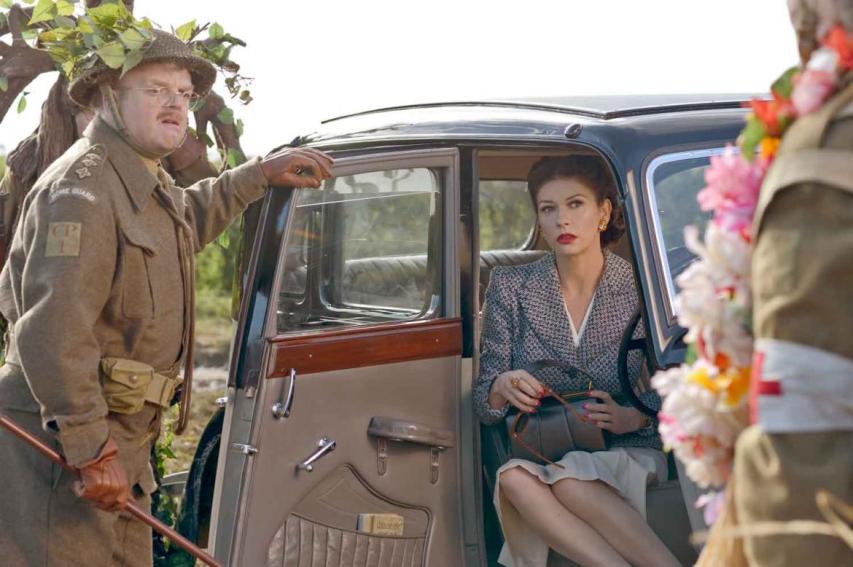A hundred years ago today, the Royal Navy lost the Battle of Coronel to Vice Admiral Graf Maximilian von Spee’s squadron of armoured and light cruisers off the coast of Chile. Rear Admiral Sir Christopher Cradock was killed along with 1,570 men when HMS Monmouth and HMS Good Hope were sunk. Public reaction was furious: blame was cast on the Admiralty and especially on the First Lord of the Admiralty, Winston Churchill. The British public fiercely believed that any British ship was more than a match for any foreign vessel, and losing two ships while inflicting no serious damage on the enemy was scandalous.
In the Plymouth Herald, Tristan Nichols explains why Plymouth in particular took the news so badly:
TODAY the figure is hard to comprehend. On November 1, 1914, just months after the start of World War One, the Royal Navy lost two warships and nearly 1,600 lives in the South Atlantic.
The outcome of ‘The Battle of Coronel’, as it would become known, sent shockwaves across Britain, not least Plymouth.
HMS Monmouth was one of the two British cruisers involved in the battle 40 nautical miles off the coast of Chile.
She was Devonport-based and Plymouth-manned.
And every one of the 735 men on board the cruiser died on the cold and stormy seas.
Hundreds more were lost on the other Royal Navy vessel, the Portsmouth-based HMS Good Hope.
The German squadron saw just three men injured during the battle.
The build-up, battle, and ultimate demise of the 4th Cruiser Squadron during that fateful day reads like a film script.
Rear Admiral Sir Christopher (Kit) Cradock led the Royal Navy squadron to hunt down and destroy the feared German East Asia Squadron.
Both sides had reportedly only been expecting to meet a solitary cruiser – but fate would play its hand.
Rear Admiral Cradock, leading two British armoured cruisers, was up against two German armoured cruisers, and a further three light cruisers.
He was reportedly given orders to engage with the enemy, despite outlining his concerns at being outnumbered and outgunned.
According to the history books the two British armoured cruisers were inferior in every respect.
Follow orders he did, and it led to a devastating outcome for the proud British squadron.
It’s not quite as clear that Cradock followed all of his orders, as Churchill had specifically instructed him to keep the old battleship HMS Canopus with his squadron at all times until a modern armoured cruiser, HMS Defence, was able to join him (Defence, however, had been recalled part-way to the Falklands). Instead, Cradock had detached Canopus to defend the coaling station in the Falkland Islands before crossing into the Pacific, headed toward Valparaiso. Without Canopus, Cradock was totally out-gunned by von Spee’s ships.
Wikipedia reports a Canadian connection with the battle:
The Coronel Memorial Library at Royal Roads Military College, now Royal Roads University in Victoria, British Columbia, Canada was named in honour of the four Canadian midshipmen who perished in HMS Good Hope at the Battle of Coronel.
Update: The Royal Canadian Navy is marking the anniversary.
The Royal Canadian Navy (RCN) will mark the Battle of Coronel on November 1st. This battle saw the first Canadian military casualties of the First World War, and the first ever casualties in the history of the RCN. RCN personnel serving today salute the following shipmates from the past:
- Midshipman Malcolm Cann, 19, of Yarmouth, Nova Scotia;
- Midshipman John V. W. Hatheway, 19, of Fredericton, New Brunswick;
- Midshipman William Archibald Palmer, 20, of Halifax, Nova Scotia; and
- Midshipman Arthur Wiltshire Silver, 20, of Halifax, Nova Scotia.
All four RCN midshipmen died in the Battle of Coronel, which took place on November 1, 1914 off the coast of central Chile near the city of Coronel.
 The Washington Redskins are in Minneapolis today to face the Minnesota Vikings. Both teams have 3-5 win/loss records and both are coming off wins last weekend. However, this weekend’s pregame festivities will include protests against the Washington team name:
The Washington Redskins are in Minneapolis today to face the Minnesota Vikings. Both teams have 3-5 win/loss records and both are coming off wins last weekend. However, this weekend’s pregame festivities will include protests against the Washington team name:



